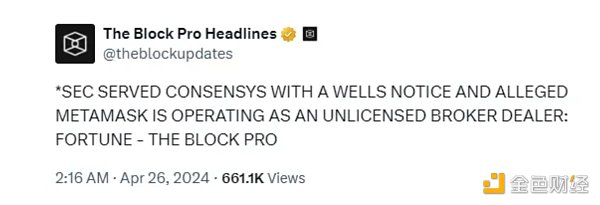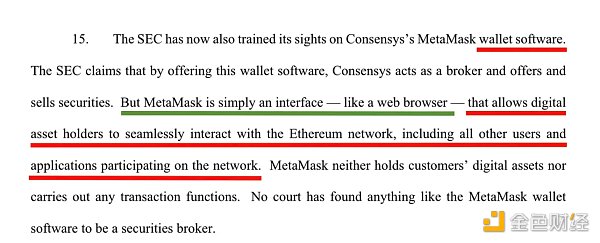Author: DeMan Source: medium Translation: Shan Ouba, Golden Finance
In the field of cryptocurrency, regulatory issues have always been the focus of attention. Recently, the SEC (U.S. Securities and Exchange Commission) has once again stirred up controversy, this time targeting Consensys subsidiary MetaMask. It is reported that the SEC has issued a Wells notice to Consensys, accusing MetaMask of operating as an unregistered broker-dealer. This news immediately attracted widespread attention and discussion within the cryptocurrency community.

Since Uniswap received the Wells notice on April 11, the regulatory atmosphere in the cryptocurrency industry seems to be getting more and more tense. Consensys, as an Ethereum infrastructure development company, has also recently been involved in this storm and has become the subject of an SEC investigation. Consensys not only refuted the SEC's allegations, but also took the initiative to file a lawsuit in federal court to seek to defend its rights. This move not only involves a power struggle between Consensys and the SEC, but may also affect the future development of the entire cryptocurrency industry.
Against this background, it is necessary for us to delve into the allegations against MetaMask and Consensys' response position. Next, we will analyze the specific charges brought by the SEC and explore the potential impact of the incident on the cryptocurrency market and regulatory environment.
SEC Charges ConsenSys for Operating MetaMask Wallet as an Unregistered Broker-Dealer
In the current legal environment of the cryptocurrency industry, the legal dispute between the U.S. Securities and Exchange Commission (SEC) and ConsenSys is particularly prominent. The U.S. Securities and Exchange Commission issued a Wells Notice to ConsenSys, accusing its MetaMask wallet of operating as an unregistered broker-dealer. This has triggered extensive discussions about the compliance of cryptocurrency service providers and the legal definition of these services.
MetaMask is an interface to the Ethereum blockchain, providing browser extensions and mobile applications that allow users to store and manage cryptocurrencies and interact with decentralized applications (DApps). MetaMask's core features include key management, which allows users to control their Ethereum and other ERC-20 tokens through private keys, and built-in transaction execution functions, which execute users' transaction instructions directly through the blockchain network without any intermediaries or agents.
The SEC’s focus is on MetaMask’s staking service, which allows users to lock tokens in smart contracts in exchange for rewards. The SEC believes that this operation may constitute broker-dealer activities and should therefore be subject to corresponding regulatory and licensing requirements. According to the SEC, any activity that promotes or assists securities transactions must comply with relevant laws and regulations, including broker-dealer registration requirements.

The core legal issues revolve around whether MetaMask’s operating model meets the definition of a broker and whether certain aspects of its services violate securities laws. Although MetaMask does not directly hold customer assets or execute buy and sell orders on its platform, the act of providing staking services through smart contracts is suspected of blurring the line between merely providing technical services to users and potentially entering the field of financial services that may require registration.
This case not only poses a direct threat to the business operations of ConsenSys and MetaMask, but also has the potential to affect the overall regulatory environment for cryptocurrency service providers and set new standards for compliance requirements across the industry. As the case progresses, both the legal community and the crypto space are paying more and more attention, hoping for clearer guidance on the legal status of cryptocurrencies.
The severity of the outcome of the lawsuit may have a far-reaching impact on the industry, and there are many details to consider.
In response to the SEC's allegations, ConsenSys quickly took countermeasures. After receiving the SEC's Wells Notice on April 10, 2024, ConsenSys did not sit idly by, but took the initiative to file a lawsuit in the Federal Court for the Northern District of Texas on April 25. ConsenSys' lawsuit claims that the SEC's attempt to classify Ethereum and its application MetaMask as securities represents an illegal overreach.
ConsenSys emphasized in court documents that its MetaMask wallet only serves as a simple interface and neither holds customers' digital assets nor performs any trading functions, and therefore should not be considered a broker. In addition, ConsenSys challenged the SEC's jurisdictional basis, arguing that its regulation of Ethereum exceeds its statutory authority because Ethereum lacks any characteristics of a security. In addition, the company cited former SEC official Bill Hinman's remarks in 2018, which explicitly stated that Ethereum is not a security but a commodity, highlighting the inconsistency between the SEC's current practice and past statements.
The lawsuit not only seeks to prevent the SEC from regulating MetaMask's staking and trading functions under securities laws, but also asks the court to confirm that MetaMask's operations do not violate federal securities laws. ConsenSys believes that classifying MetaMask as a securities broker will seriously hinder Web3 developers from continuing to develop innovative applications and affect the technological progress and development of the entire industry.
Another key aspect of this legal battle is ConsenSys's request to confirm that its Fifth Amendment rights and rights under the Administrative Procedure Act have not been violated, which means that any view that Ethereum is a security will violate these rights. ConsenSys's actions not only reflect the cryptocurrency industry's urgent need for regulatory clarity, but also demonstrate the industry's increasingly firm and proactive stance when facing regulatory challenges.
Ultimately, this lawsuit may have a far-reaching impact on the legal landscape of the entire cryptocurrency industry, especially in determining the legal status of Ethereum and its applications. As the case progresses, the cryptocurrency community and its stakeholders will continue to pay attention to the potential impact of the case on future industry regulation and operating models.
This lawsuit will be an important milestone in the industry's compliance process, and its subsequent developments are worth paying attention to.
Earlier this year, the U.S. Securities and Exchange Commission (SEC) approved the first Bitcoin spot ETF in the United States, marking an important step in the regulation of digital assets. As this approval set a precedent, many expected that the approval of an Ethereum spot ETF was only a matter of time. However, this is not the first time that ConsenSys has clashed with the SEC, and tensions between the two sides are escalating.
In a comment letter submitted to the SEC, ConsenSys strongly advocated for the approval of an Ethereum spot ETF and refuted the SEC's concerns about potential fraud and manipulation. The letter detailed the advantages of Ethereum's PoS mechanism, including fast block confirmation, distributed verification process, high attack costs, and low environmental impact, and clearly emphasized that its security far exceeds Bitcoin's PoW mechanism.
Although the SEC approved the Ethereum futures ETF in October 2023, indicating that it tacitly recognized Ethereum's non-security attributes, the SEC's position on the approval of spot ETFs remains hesitant. SEC Chairman Gary Gensler has maintained an ambiguous attitude towards the legal status of Ethereum, coupled with pressure from the political arena, such as Senator Elizabeth Warren's harsh criticism of Bitcoin spot ETFs, adding uncertainty to the Ethereum ETF approval process.
In addition, the volatility of the cryptocurrency market will also affect people's sentiment towards Ethereum. Although Bitcoin dominates the market, Ethereum and its so-called "Ethereum killers" such as Solana are not far behind. There are doubts within the community about whether the Ethereum ETF can boost ETH prices, which reflects the current instability of the cryptocurrency market and the desire for regulatory clarity.
Overall, ConsenSys's legal battle with the SEC highlights the urgent need for the cryptocurrency industry to establish a clear regulatory framework. As these disputes and lawsuits develop, the future direction of the entire industry and the status of Ethereum will be closely watched. For cryptocurrency enthusiasts who seek the latest developments and in-depth analysis, it is particularly important to keep abreast of industry developments and regulatory changes.











